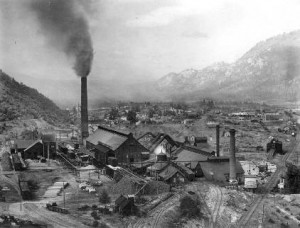10/19/12: How the Historian Can Help in Superfund Cases
October 19, 2012One of SHRA’s areas of specialization is expert litigation support. Since some of our readers may not be familiar with that facet of our work, we wanted to explore various types of cases in which our historians have provided expert research, analysis and sworn testimony in support of a legal argument.
We’re going to start this series of blogs with how historical research can be used in Superfund/CERCLA disputes. Most of these cases revolve around the issue of liability for pollution and responsibility for clean-up of affected areas. Whether your issue is proving the liability of a polluter for your client or, alternately, defending a claim in part by locating other parties who might also bear partial responsibility, using a historian in a CERCLA/Superfund case can be extremely effective in telling the story of industry – and how your client fits into that story – on a CERCLA-regulated site. Because these sites are often complex in their chemistry and/or metallurgy and their ownership history, and are usually part of a larger regional or national scene, a historian can cast the site’s historical narrative in human terms and provide context for the technical data with which your judge may be inundated.
CERCLA cases usually require answers to the following: Who has owned and operated the polluting entities – known as Potentially Responsible Parties (PRPs) – since their inception? How did these parties store their waste? Did they meet the law, or go above and beyond the requirements in disposing of or storing their waste? How did their waste disposal practice compare to industry standards? Are there other PRPs that have yet to be identified?
When choosing any expert witness or analyst, it is important to utilize a firm that has familiarity with the CERCLA process, and understands the stages and procedure of the Superfund law as well as how and when it interacts with other federal laws, such as the older Resource Conservation and Recovery Act (1976). There are other specific things to consider when choosing a historical research firm for these cases. First, the firm should have staff that is conversant in the time period under review, with a deep understanding of the socio-political and economic nuances of the era, as well as its overarching narrative. Your historian should also be knowledgeable about government regulations and how to conduct government agency research, as well as have a good understanding of the industry, trade and private resource collections that exist and must be explored. As in any field, experience builds expertise and, quite often, it is the professional contacts with archivists, academics and other expert consultants built over time that lead to previously unknown repositories of information that can make or break a case. Finally, your historical research firm must be able to convey difficult technical information in a manner that is easily understood by a layperson. Providing the court with a useful product that maintains the integrity of the primary research findings and is completed to the standards of the historical profession is paramount. This includes not just a well-written report, but also cogent, confident testimony, and the capability to digitize documents and employ modern technology for the “smart courts” and the judges that run them.
CERCLA cases are some of the most complex litigation work that historians do. Choosing a well-organized, well-staffed historical research firm could make a difference in the case’s outcome. Our staff has a deep understanding of many industries regulated by the federal government, including the mining of many metals and minerals, and we are proud of the work that SHRA has contributed on multiple CERCLA cases. Should you have any questions or concerns with regard to CERCLA matters, we would welcome the opportunity to put our skills to work for you.
– Jennifer Stevens
October 19, 2012

